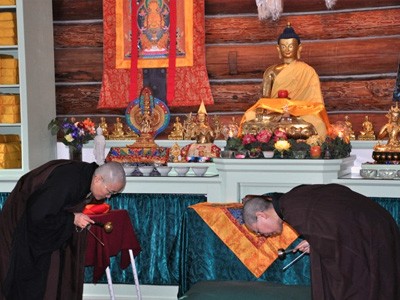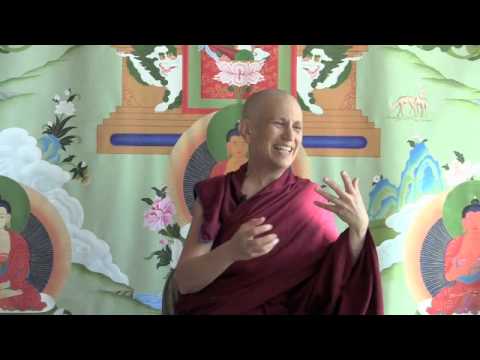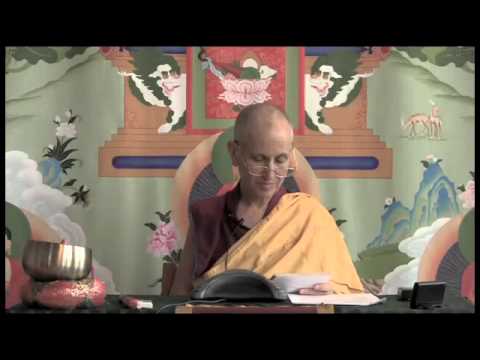Advice on preparing for ordination

The anagarikas at Sravasti Abbey asked Ven. Jendy and Ven. Jenying, both bhiksunis for over 25 years, for advice on how to prepare for monastic ordination.
Reflecting on your motivation
Key questions to consider:
- Why do you want to be a monastic?
- How do you feel about giving up sense pleasures and your worldly
aspirations? - Why are you choosing a monastic life, instead of all the other options that you
have in terms of how to lead your life? - Have you spent some time living with a sangha community? Do you like the
way of life, and are you happy living with the sangha? - What aspirations would you like to fulfil as a monastic?
Think carefully about your motivation to ordain.
- Ordination is a decision about a path you want to practice not just for this life, but for many lifetimes.
- It is important to experience day-to-day life with the sangha before ordaining, as this will give you a more realistic perspective.
- Remember that ordaining is an active choice, and not something that you should feel pressure to do.
- Some people disrobe because they are disappointed with their teacher or their community. However, they could have found a new teacher or community—why did they decide to disrobe?
Practicing as a layperson and practicing as a monastic are both full of
difficulties. However, these two paths bring much different results.
- Think carefully about the pros and cons of both paths.
- After about 30 years, you can see the difference—a layperson continues to accumulate attachment and his progress might stagnate, but a monastic’s practice goes deeper.
Think about the worst-case scenario.
- You may not have the support of a monastic community, and you may not be near your teacher. Can you continue to hold your precepts, and be a person who chooses to uphold the Dharma?
Living in community
Be realistic about your expectations of your teacher.
- Your teacher might do things that you find difficult to endure e.g. scolding you in public. Remember that your teacher acts with a good motivation, in order to train your mind. Your teacher has lived many more years in ordained life, and knows what will help you in ordained life.
- Your teacher has many disciples and duties to attend to—you cannot ordain expecting to be your teacher’s “only child.” New students will come along and you will experience jealousy and other hindrances.
We often build our sense of confidence upon others’ approval, resulting in attachment to our self-image. This is like a sandcastle on the beach that will get washed away.
- Instead, we should build our sense of self on our Buddha nature.
- The 6th Zen Patriarch said to the 5th Zen Patriarch, “The people from the South of China are too unruly to ordain.” The 5th Zen Patriarch responded, “Is there any difference in their Buddha nature?”
You may get upset when others do not behave in the way you think they
should. E.g. “I don’t like the way this person walks.”
- Check if your negative emotions arise because you are attached to your own standards. Try to consider why the other person might behave in a particular way.
- This can help you to empathise with fellow practitioners, and develop the skilful means to give feedback in a way that will help them grow.
If there is a dispute in the community, will you take sides or lose faith in the Dharma?
- There was a sangha community in Taiwan where there was a dispute between leaders, but the community did not take sides. This demonstrated the strength of the community and their practice.
Advice for dealing with difficulties
Remember that the problem is not with the Dharma, but with our afflictions.
- As long as we have not realised emptiness, we will have self-grasping ignorance, and conflicts with others will result.
- Remember to separate your faith in the Dharma from how you feel about
people around you. - No matter how busy you are, you must make time to study and deepen your understanding of the Dharma.
We sometimes confuse sensitivity towards our own feelings with compassion.
- If this were true, then why would practicing “compassion” in this manner bring us greater suffering?
- Focusing your sensitivity on a single object—your own feelings—is a source
of suffering. - Extending that sensitivity to others’ feelings can open the door to true compassion and reduce your suffering.
Three things that can help keep the mind on the path:
- Recollect that the Dharma is the best medicine – look for answers in the sutras in times of difficulty.
- Recollect why you have chosen to join a particular community or embark on a particular course of study.
- Recollect why you decided to become a monastic.


